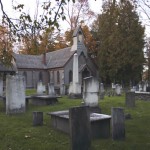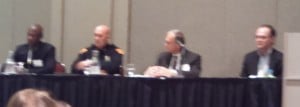
“Out of the night that covers me,
Black as the Pit from pole to pole,
I thank whatever gods may be
For my unconquerable soul.”
“Invictus” by William Ernest Henley
In our wanderings through the strange world of interfaith we are seeking to understand and to celebrate the richness of our diversity, but I believe that the seeds of that understanding and celebration are rooted in a deeper appreciation of the human universality of our experience of life and of the soul.
As different as we each are, one from the other, there are certain experiences in which we share, not only with one another, but with every human being who has ever set foot upon this planet we call home. Birth, growing old, and death have been a part of human experience ever since mankind first came to understand the finiteness of life. And as we became aware that our lives would end and we would cease to be in a physical sense, then did we search for an assurance of our own immortality.
We don’t know when mankind first appreciated the concept of the “soul”, a part of a human being that survived past death. Yet as early as 14,000 years ago there are Neanderthal burials that include grave goods, flowers, and bodies painted to take on the semblance of life. What purpose would grave goods serve if there were no afterlife?
Certainly the ancient Egyptians with their practices of mummification believed in an afterlife, as did the Greeks, the Romans, the Celts and other ancient peoples. All religions for which we now have records teach us what we must do if our souls are to enter the afterlife or to be reborn here on earth, or to merge with the One.
And every religions appears to agree on the nature of the soul. It is that part of us which is immortal, which survives the death of the physical body, and which links us to the Divine. It is that belief that we cling to when we find ourselves standing in the shadow of death, either for ourselves or those we hold dear.
The last months of 2014 were full of reminders of mortality for myself and for many of my friends. Some very dear Christian friends fought a battle with cancer, which they have hopefully won. Some other friends, both Christian and non-Christian have watched loved ones become critically ill or die. In my own case I have struggled with dealing with my own husband’s fight with cancer and beginning chemotherapy, and with my brother’s unexpected passing on the Winter Solstice.
Throughout the struggles we went through with grief and heartache we reached out to each other with our strength and our prayers. And it matter not one whit whether those prayers were to the God of the Bible or the Gods of our Pagan ancestors. What mattered was that we all walked through the same vale of shadows and we each experienced the same pain of loss of a loved one.
Doesn’t this tell us something? Doesn’t it suggest to us that we should be paying more attention to the common humanity of each of us and less about the differences that separate us? I think it does. In the commonality of our experience of death and of loss we are all one in our sense of grief, and in our belief in the immortality of the souls of those we have lost. In this place where all humankind must go at one time or another, we have found peace between our religious beliefs and the ability to reach out in kindness one to the other.
And if we can find this community at such a time, can we not find it towards each other on other occasions as well?
Photo taken by myself at the Ring of Brodgar, 2009












